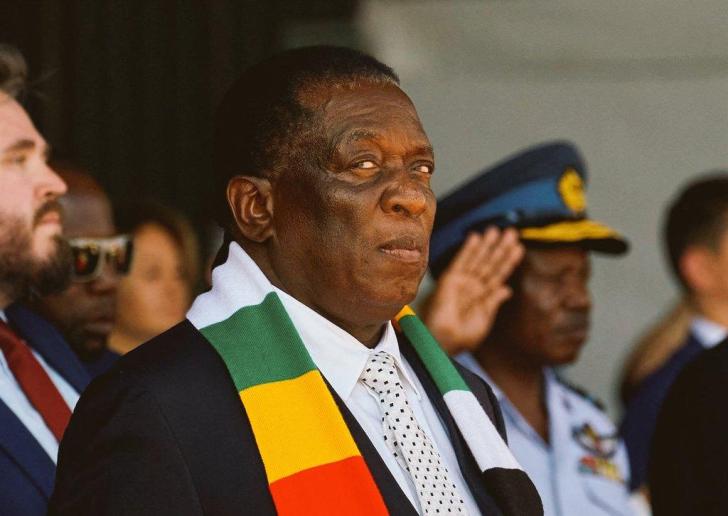News / National
Mnangagwa calls for repatriation of Zimbabwe skulls from British museums
05 Nov 2024 at 08:27hrs |
0 Views

President Emmerson Mnangagwa has renewed calls for the repatriation of the remains of Chimurenga war heroes from Britain, emphasizing the need for their interment in "a dignified manner." This statement was made during his address at the funeral of late hero Jaison William Chezhira Chakaipa Chirinda, underscoring the ongoing quest for recognition and justice regarding the impacts of colonialism in Zimbabwe.
Among the remains sought are those of prominent historical figures such as Mbuya Nehanda, Sekuru Kaguvi, Chief Makoni Chingaira, Chief Mapondera, and Chief Chinengundu Mashayamombe. These leaders played significant roles in the uprisings against colonial rule, and their remains are believed to have been taken to Britain as war trophies and are currently being used for research purposes.
In 2022, a Zimbabwean delegation visited the UK seeking the return of the skulls of these late-19th-century anti-colonial heroes. During this visit, representatives from London's Natural History Museum and Cambridge University expressed willingness to cooperate with Zimbabwe in repatriating the human remains.
Mnangagwa stated, "We remind the British Government and people that the spirits of our heroes will not rest until their remains are repatriated and interred in a dignified manner. Going forward, we urge the British Government to return the remains of our people to Zimbabwe." His comments come amid a broader demand for colonial reparations and an official apology from Britain for past injustices.
The President also referenced a recent initiative launched by the Zimbabwe National Elders Forum, titled "Land Displacements: The Untold Stories of Crimes, Injustices, Trauma, and Losses Experienced by Indigenous Zimbabweans During the Colonial Era (1890 to 1980), A Case for Reparations." This study aims to document the historical injustices suffered by indigenous Zimbabweans at the hands of the British government and its settlers.
In addition to the call for repatriation, Mnangagwa assured that the government is committed to compensating former white farmers whose land was seized during the land reform program. He emphasized that while the Zimbabwean government recognizes its obligations to former farmers, the British government must also acknowledge its historical responsibilities. "We call upon the British government, whose predecessor governments were responsible for pillaging and brutalizing us, to take responsibility and not remain indifferent to the cries of Zimbabweans for justice," he said.
The issue of repatriation and reparations remains a critical topic in Zimbabwe, with ongoing discussions about the legacy of colonialism and the need for healing and reconciliation.
Among the remains sought are those of prominent historical figures such as Mbuya Nehanda, Sekuru Kaguvi, Chief Makoni Chingaira, Chief Mapondera, and Chief Chinengundu Mashayamombe. These leaders played significant roles in the uprisings against colonial rule, and their remains are believed to have been taken to Britain as war trophies and are currently being used for research purposes.
In 2022, a Zimbabwean delegation visited the UK seeking the return of the skulls of these late-19th-century anti-colonial heroes. During this visit, representatives from London's Natural History Museum and Cambridge University expressed willingness to cooperate with Zimbabwe in repatriating the human remains.
Mnangagwa stated, "We remind the British Government and people that the spirits of our heroes will not rest until their remains are repatriated and interred in a dignified manner. Going forward, we urge the British Government to return the remains of our people to Zimbabwe." His comments come amid a broader demand for colonial reparations and an official apology from Britain for past injustices.
The President also referenced a recent initiative launched by the Zimbabwe National Elders Forum, titled "Land Displacements: The Untold Stories of Crimes, Injustices, Trauma, and Losses Experienced by Indigenous Zimbabweans During the Colonial Era (1890 to 1980), A Case for Reparations." This study aims to document the historical injustices suffered by indigenous Zimbabweans at the hands of the British government and its settlers.
In addition to the call for repatriation, Mnangagwa assured that the government is committed to compensating former white farmers whose land was seized during the land reform program. He emphasized that while the Zimbabwean government recognizes its obligations to former farmers, the British government must also acknowledge its historical responsibilities. "We call upon the British government, whose predecessor governments were responsible for pillaging and brutalizing us, to take responsibility and not remain indifferent to the cries of Zimbabweans for justice," he said.
The issue of repatriation and reparations remains a critical topic in Zimbabwe, with ongoing discussions about the legacy of colonialism and the need for healing and reconciliation.
Source - NewZimbabwe
Join the discussion
Loading comments…






























